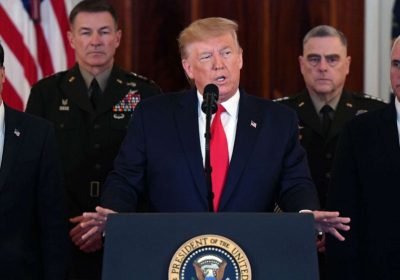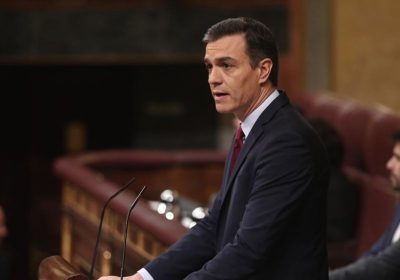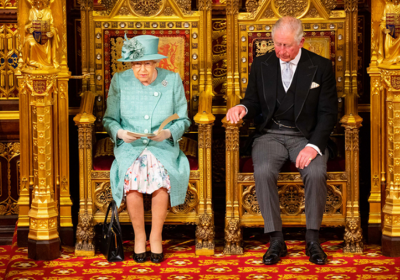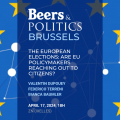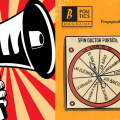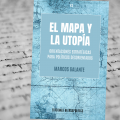Remembrance Sunday was made particularly poignant this year by the presence and sacrifice of British troops in Iraq. We can be very proud of their heroism and courage.
«The harsh reality is that having been liberated from Saddam, Iraq now has to be freed from terrorism.
«Let me repeat that the insurgents and terrorists have been offered an amnesty if they will lay down their weapons; and agree that elections not terror should decide the future of Iraq. No-one has wanted the events of the past 10 days in Falluja. But when negotiations were refused the Iraqi government had no option but to insist that the town could not continue to be run by such people. There will be, quite properly, talk of civilian casualties in the course of the operation by the MNF and Iraqi army. I hope there is some account taken also of the emerging story – as in Najaf and Samarra – of the actions of the insurgents: people tortured and executed, a town held to ransom, hostages taken and killed. As elsewhere, when order is taken back, there is money and help ready to give the ordinary people there a better life.
«Iraq has dramatically surfaced differences between Europe and America and Britain’s role in both alliances. The relationship is under question as never before. So now is the time to defend it.
«Britain has a lot to be confident about. 2 million more people are in jobs. Only the UK has seen sustained growth each and every quarter for the last 7 years – a record that no other country in the G8 can claim. Its investment in healthcare and education – combined with strong reform – is paying dividends. It is a country which, for all the concern over asylum and immigration, is essentially at peace with its diversity of cultures and faiths, indeed rather proud of it. Britain is working.
«But I will tell you the oddest part of being British Prime Minister in the year 2004. A country that has so much reason to be optimistic is so easily persuaded into pessimism.
«Nowhere is this clearer than in evaluating Britain’s place in the world. There is only one superpower in the world today and we are its strong ally. The most powerful political grouping that has created the largest economic market in the world is the European Union – and we are a leading member. It’s a great position. We should celebrate it.
«However, one part of opinion wants to cool the American alliance. Another part wants us out or semi-out of Europe. In fact, some parts of opinion are now both anti-America and anti-Europe.
«Yet, the world is more interdependent than ever. Financial markets, issues of terrorism and security, global trade, environmental degradation require more and more international concert and co-operation.
«And Britain, 60 million in population, limited in geographical size, is only going to wield power in this world through alliances. China and India with over a billion people each; Russia with its land mass; not to say emerging Asia and Latin America, let alone the USA itself, mean that if we didn’t have alliances with which to further our national interest, we would have to invent them.
«But we do have them; actually we have the best two you could have, at least for now. So why on earth would any rational country, seeking its own interest, sacrifice or diminish them?
«The reason is because the country is not persuaded that either alliance is in pursuit of the hard-headed British interest, rather than some airy notion of global influence.
«So: why America; why Europe; why the two together; and what’s in it for Britain?
«First, the transatlantic alliance. This alliance with America saw us through to victory in World War II. It then protected us and stood firm against the Soviet Union and ushered in the collapse of what had become a totalitarian monster. A recent survey concluded that «the economic relationship between the US and Europe is by a wide margin the deepest and broadest between any two continents in history and it is accelerating». Tensions over Iraq did not stop corporate America pumping nearly $87 billion of direct investment into Europe in 2003, whilst corporate France put over $4 billion back into the US. I’m not saying America does not make mistakes; does not in its insularity of thinking sometimes seem obstinate to the concerns of the rest of the world. American political culture, for example on the death penalty, is different from European culture, and in Britain, in this respect at least, our culture is more European.
«But I know one thing. If we were under direct threat, America would be our ally. I know that its people enjoy, as we have seen, a vibrant competitive democracy; and that in America, Hispanics, blacks, Asians and former Europeans live together, worship in their different ways and can rise from the bottom to the top in a manner we could do well to emulate. I didn’t agree with Michael Moore’s film. But in America he was able to make it and be praised for it. This is called freedom. We are in danger of forgetting these simple truths.
«And when America was attacked on 11 September 2001 – a brutal, unprovoked slaughter of innocent people, planned in the previous administration when Iraq and Afghanistan had not happened, when President Clinton was working flat out to secure peace between Palestinians and Israelis – that was an attack designed for the purpose of forcing American out of its role in the world; to get it to disengage from the Middle East; to remove it as an obstacle to the progress of the new fanatical extremism the terrorists represent.
«If America were to pull up the drawbridge, retreat from its obligations and alliances abroad, the terrorists would attack the rest of us. They are not interested in America as America. They are interested in America as the most powerful actor in pursuit of beliefs they fear as much as we value them.
«And if America did withdraw: if when Kosovo came up, they said no; told us to sort out Al Qaida in Afghanistan ourselves; said we could tackle nuclear proliferation on our own, where would we be? Would China be ready to fill the space? Or Russia? Or India, great though those nations are and strong though our modern partnership with them is?
«We are not fighting with America in Iraq because we are their allies. We are their allies because we believe that their fight against terrorism is our fight too; because if they fail, we fail; because their way of life and ours is lit by the same light of freedom, the same love of democracy, the same fellowship of reason.
«If we in Europe ever need final convincing of this, talk to the recent democracies of central and Eastern Europe; tell them we are indifferent to the American alliance and see in their shiver of apprehension the most significant argument for us maintaining it.
«9/11 was an attack on us all. It showed the full potency of this worldwide movement of terrorism. It meant we had to shift policy fundamentally from managing this terrorist threat to confronting it; and that rogue states such as Iraq, in multiple breach of UN resolutions, should be brought into compliance, to signal a completely different approach to the illegal development of chemical, biological and nuclear weapons in the world. When the consequence of our action is to remove the Taliban in Afghanistan and Saddam and his sons in Iraq, causes that should surely unite progressives everywhere; it is not a sensible or intelligent response for us in Europe to ridicule American arguments and parody their political leadership.
«What is entirely sensible, however, is for Europe to say terrorism won’t be beaten by toughness alone. Here there is an opportunity for Europe. American policy is evolving. Increasingly both Europe and America are coming to realise that lasting security against fanatics and terrorists cannot be provided by conventional military force; but requires a commitment to democracy, freedom and justice. The only stable Afghanistan will be a democratic Afghanistan. Ultimately it is democracy in Iraq that will defeat the insurgents, which is why they are so desperate to stop it. The only viable Palestinian State will not just be based on territory but on democratic values. Likewise the best help we can give Africa is not just through aid, vital though that is and on opening up trade, but through supporting countries in their desperate and fraught attempts to build the institutions of good governance.
«Democracy is the meeting point for Europe and America. I am not, repeat not, advocating a series of military solutions to achieve it. But I am saying that patiently but plainly Europe and America should be working together to bring the democratic human and political rights we take for granted, to the world denied them. When Kofi Annan reports back to the UN in some weeks time on UN reform one reform we should insist on is a greater role of leadership for the UN on the responsibility of states to protect not injure their own citizens.
«None of this will work, however, unless America too reaches out. Multilateralism that works should be its aim. I have no sympathy for unilateralism for its own sake.
«»We have so much to do together: to promote democracy, justice and development; to fight against terrorism and the spread of weapons of mass destruction; to prevent wars, to strengthen peace, and to act against the root causes of terrorism.»
«Not my words, but those of France’s Foreign Minister reported in the FT today following his letter to the Wall St Journal last week.
«In short, neither Europe nor the US should be arrogant about the other. What we share is, in the end, of oceanic depth compared to the shallow water of any present discord. Not the Balkans, nor the Middle East, nor world trade, Africa or climate change, not the dangers of proliferation, nor the challenge of the emerging economic power of China, will be resolved, at least wisely, without a partnership between the two.
«Which brings me to Britain in Europe. Here is Europe at a crossroads. Its numbers have swelled to 25. Others queue to join. One of them, Turkey, is a harbinger of enormous future change, and would be as a member, an extraordinary symbol of a multi-faith Europe.
«Europe is divided over the scale of economic reform. And Iraq has divided it further into those enthusiastic for the transatlantic alliance and those nervous of it. So it is a crucial, decisive moment in time.
«Here is Britain. We believe passionately that Europe must take the road of reform in its economy and renewal of its alliance with America. We have allies in this argument. We are one of the four largest nations in the EU. A wrong course in Europe and it weakens our economy and our political influence.
«We have just had a debate in Europe about the new rules governing the new union of 25 and more. It is generally heralded everywhere (but Britain) as a triumph of British diplomacy. It is, overtly, an expression of Europe as a union of nation states. It is, implicitly, the rejection of Europe as a federal superstate.
«So Europe matters profoundly. There is an argument raging as to its future direction. The argument can be won. And what am I advised to do? At the very moment of maximum importance, of acute urgency of decision-making, when all is in the balance and to play for, I am told to leave our allies in the lurch, walk away from the argument, retreat into a eurosceptic sulk and call it «standing up for Britain».
«And why? Because we have confused identity with isolation; the more «alone» we are, the more purely British. What makes it odd, is that its not as if full-hearted participation by Britain in Europe is somehow against the tide of world affairs. The truth is, the world over, nations are moving closer together, pooling risk and opportunity, seeking in this ever more interdependent world, the comfort and necessity of alliance.
«So my contention is simple: Britain should be proud of its alliance with America; clear in its role in Europe; and a tireless advocate of a strong bond between the two. And when people say its difficult: look at the strains, feel the stresses, study the astrology of Venus and Mars, I say: of course it’s difficult, but that doesn’t mean it isn’t still right and worth striving for. And what is the alternative? There isn’t any except one whose difficulties would make those between Europe and America fade into moonlike, pale insignificance.
«So its as well, every so often to go back to fundamentals and perceive the difference between what is fashionable and what is true.
«For Britain, for once the word «unique» is fitting. We have a unique role to play. Call it a bridge, a two lane motorway, a pivot or call it a damn high wire, which is how it often feels; our job is to keep our sights firmly on both sides of the Atlantic, use the good old British characteristics of common sense and make the argument. In doing so, we are not subverting our country either into an American poodle or a European municipality, we are advancing the British national interest in a changed world in the early 21st century. And yes, we should be optimistic and confident of an ability to do it.

